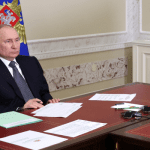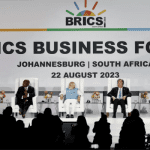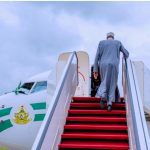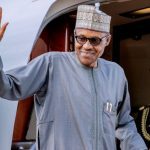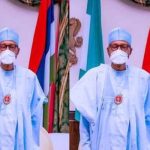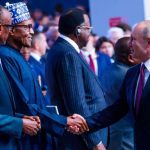Russia’s president will not attend a summit in South Africa next month, according to the country’s presidency.
The announcement comes after South Africa’s leader said any attempt to arrest Vladimir Putin would be a declaration of war against Russia.
South Africa is an ICC signatory and expected to help in Mr Putin’s arrest.
Russia’s Foreign Minister Sergei Lavrov will represent the country at the two-day summit instead.
However, Mr Putin will take part in the Brics conference – an acronym for Brazil, Russia, India, China and South Africa – by video link, Kremlin spokesperson Dmitry Peskov said, according to Russian media.
In a statement, South Africa’s presidency described the agreement for Mr Putin not to attend as “mutual” and said it had come about following a “number of consultations” on the summit.
Supporters of Russia have criticised the decision, saying South Africa should have insisted and used its sovereignty to protect and defend its friend.
South Africa’s invitation to Mr Putin, issued before the ICC accused him of war crimes in Ukraine, has caused controversy both nationally and internationally.
But President Cyril Ramaphosa’s government became frantic as pressure to arrest President Putin mounted.
The biggest opposition party, the Democratic Alliance, went to court to try to force the authorities to arrest Mr Putin, should he set foot in the country. Global human rights group Amnesty International was also part of the challenge.
Court documents reveal that Mr Ramaphosa was firmly against any such move, stating that national security was at stake.
Mr Peskov denied Moscow had told South Africa that arresting its president would mean an act of war, but said it was “clear to everyone what [that kind of] infringement against the head of the Russian state would mean”.
Russia has consistently described the ICC arrest warrant as outrageous and legally void, because the country is not a member of the organisation.
The African continent remains split over the war between Russia and Ukraine, with some countries showing reluctance to back United Nations’ resolutions condemning Russia for its actions in Ukraine.
A sanctioned Russian oligarch, Viktor Vekselberg, is said to be one of the biggest donors to South Africa’s governing party, the African National Congress (ANC).
Russia’s president will not attend a summit in South Africa next month, according to the country’s presidency.
The announcement comes after South Africa’s leader said any attempt to arrest Vladimir Putin would be a declaration of war against Russia.
South Africa is an ICC signatory and expected to help in Mr Putin’s arrest.
Russia’s Foreign Minister Sergei Lavrov will represent the country at the two-day summit instead.
However, Mr Putin will take part in the Brics conference – an acronym for Brazil, Russia, India, China and South Africa – by video link, Kremlin spokesperson Dmitry Peskov said, according to Russian media.
In a statement, South Africa’s presidency described the agreement for Mr Putin not to attend as “mutual” and said it had come about following a “number of consultations” on the summit.
Supporters of Russia have criticised the decision, saying South Africa should have insisted and used its sovereignty to protect and defend its friend.
South Africa’s invitation to Mr Putin, issued before the ICC accused him of war crimes in Ukraine, has caused controversy both nationally and internationally.
But President Cyril Ramaphosa’s government became frantic as pressure to arrest President Putin mounted.
The biggest opposition party, the Democratic Alliance, went to court to try to force the authorities to arrest Mr Putin, should he set foot in the country. Global human rights group Amnesty International was also part of the challenge.
Court documents reveal that Mr Ramaphosa was firmly against any such move, stating that national security was at stake.
Mr Peskov denied Moscow had told South Africa that arresting its president would mean an act of war, but said it was “clear to everyone what [that kind of] infringement against the head of the Russian state would mean”.
Russia has consistently described the ICC arrest warrant as outrageous and legally void, because the country is not a member of the organisation.
The African continent remains split over the war between Russia and Ukraine, with some countries showing reluctance to back United Nations’ resolutions condemning Russia for its actions in Ukraine.
A sanctioned Russian oligarch, Viktor Vekselberg, is said to be one of the biggest donors to South Africa’s governing party, the African National Congress (ANC).
Russia’s president will not attend a summit in South Africa next month, according to the country’s presidency.
The announcement comes after South Africa’s leader said any attempt to arrest Vladimir Putin would be a declaration of war against Russia.
South Africa is an ICC signatory and expected to help in Mr Putin’s arrest.
Russia’s Foreign Minister Sergei Lavrov will represent the country at the two-day summit instead.
However, Mr Putin will take part in the Brics conference – an acronym for Brazil, Russia, India, China and South Africa – by video link, Kremlin spokesperson Dmitry Peskov said, according to Russian media.
In a statement, South Africa’s presidency described the agreement for Mr Putin not to attend as “mutual” and said it had come about following a “number of consultations” on the summit.
Supporters of Russia have criticised the decision, saying South Africa should have insisted and used its sovereignty to protect and defend its friend.
South Africa’s invitation to Mr Putin, issued before the ICC accused him of war crimes in Ukraine, has caused controversy both nationally and internationally.
But President Cyril Ramaphosa’s government became frantic as pressure to arrest President Putin mounted.
The biggest opposition party, the Democratic Alliance, went to court to try to force the authorities to arrest Mr Putin, should he set foot in the country. Global human rights group Amnesty International was also part of the challenge.
Court documents reveal that Mr Ramaphosa was firmly against any such move, stating that national security was at stake.
Mr Peskov denied Moscow had told South Africa that arresting its president would mean an act of war, but said it was “clear to everyone what [that kind of] infringement against the head of the Russian state would mean”.
Russia has consistently described the ICC arrest warrant as outrageous and legally void, because the country is not a member of the organisation.
The African continent remains split over the war between Russia and Ukraine, with some countries showing reluctance to back United Nations’ resolutions condemning Russia for its actions in Ukraine.
A sanctioned Russian oligarch, Viktor Vekselberg, is said to be one of the biggest donors to South Africa’s governing party, the African National Congress (ANC).
Russia’s president will not attend a summit in South Africa next month, according to the country’s presidency.
The announcement comes after South Africa’s leader said any attempt to arrest Vladimir Putin would be a declaration of war against Russia.
South Africa is an ICC signatory and expected to help in Mr Putin’s arrest.
Russia’s Foreign Minister Sergei Lavrov will represent the country at the two-day summit instead.
However, Mr Putin will take part in the Brics conference – an acronym for Brazil, Russia, India, China and South Africa – by video link, Kremlin spokesperson Dmitry Peskov said, according to Russian media.
In a statement, South Africa’s presidency described the agreement for Mr Putin not to attend as “mutual” and said it had come about following a “number of consultations” on the summit.
Supporters of Russia have criticised the decision, saying South Africa should have insisted and used its sovereignty to protect and defend its friend.
South Africa’s invitation to Mr Putin, issued before the ICC accused him of war crimes in Ukraine, has caused controversy both nationally and internationally.
But President Cyril Ramaphosa’s government became frantic as pressure to arrest President Putin mounted.
The biggest opposition party, the Democratic Alliance, went to court to try to force the authorities to arrest Mr Putin, should he set foot in the country. Global human rights group Amnesty International was also part of the challenge.
Court documents reveal that Mr Ramaphosa was firmly against any such move, stating that national security was at stake.
Mr Peskov denied Moscow had told South Africa that arresting its president would mean an act of war, but said it was “clear to everyone what [that kind of] infringement against the head of the Russian state would mean”.
Russia has consistently described the ICC arrest warrant as outrageous and legally void, because the country is not a member of the organisation.
The African continent remains split over the war between Russia and Ukraine, with some countries showing reluctance to back United Nations’ resolutions condemning Russia for its actions in Ukraine.
A sanctioned Russian oligarch, Viktor Vekselberg, is said to be one of the biggest donors to South Africa’s governing party, the African National Congress (ANC).
Russia’s president will not attend a summit in South Africa next month, according to the country’s presidency.
The announcement comes after South Africa’s leader said any attempt to arrest Vladimir Putin would be a declaration of war against Russia.
South Africa is an ICC signatory and expected to help in Mr Putin’s arrest.
Russia’s Foreign Minister Sergei Lavrov will represent the country at the two-day summit instead.
However, Mr Putin will take part in the Brics conference – an acronym for Brazil, Russia, India, China and South Africa – by video link, Kremlin spokesperson Dmitry Peskov said, according to Russian media.
In a statement, South Africa’s presidency described the agreement for Mr Putin not to attend as “mutual” and said it had come about following a “number of consultations” on the summit.
Supporters of Russia have criticised the decision, saying South Africa should have insisted and used its sovereignty to protect and defend its friend.
South Africa’s invitation to Mr Putin, issued before the ICC accused him of war crimes in Ukraine, has caused controversy both nationally and internationally.
But President Cyril Ramaphosa’s government became frantic as pressure to arrest President Putin mounted.
The biggest opposition party, the Democratic Alliance, went to court to try to force the authorities to arrest Mr Putin, should he set foot in the country. Global human rights group Amnesty International was also part of the challenge.
Court documents reveal that Mr Ramaphosa was firmly against any such move, stating that national security was at stake.
Mr Peskov denied Moscow had told South Africa that arresting its president would mean an act of war, but said it was “clear to everyone what [that kind of] infringement against the head of the Russian state would mean”.
Russia has consistently described the ICC arrest warrant as outrageous and legally void, because the country is not a member of the organisation.
The African continent remains split over the war between Russia and Ukraine, with some countries showing reluctance to back United Nations’ resolutions condemning Russia for its actions in Ukraine.
A sanctioned Russian oligarch, Viktor Vekselberg, is said to be one of the biggest donors to South Africa’s governing party, the African National Congress (ANC).
Russia’s president will not attend a summit in South Africa next month, according to the country’s presidency.
The announcement comes after South Africa’s leader said any attempt to arrest Vladimir Putin would be a declaration of war against Russia.
South Africa is an ICC signatory and expected to help in Mr Putin’s arrest.
Russia’s Foreign Minister Sergei Lavrov will represent the country at the two-day summit instead.
However, Mr Putin will take part in the Brics conference – an acronym for Brazil, Russia, India, China and South Africa – by video link, Kremlin spokesperson Dmitry Peskov said, according to Russian media.
In a statement, South Africa’s presidency described the agreement for Mr Putin not to attend as “mutual” and said it had come about following a “number of consultations” on the summit.
Supporters of Russia have criticised the decision, saying South Africa should have insisted and used its sovereignty to protect and defend its friend.
South Africa’s invitation to Mr Putin, issued before the ICC accused him of war crimes in Ukraine, has caused controversy both nationally and internationally.
But President Cyril Ramaphosa’s government became frantic as pressure to arrest President Putin mounted.
The biggest opposition party, the Democratic Alliance, went to court to try to force the authorities to arrest Mr Putin, should he set foot in the country. Global human rights group Amnesty International was also part of the challenge.
Court documents reveal that Mr Ramaphosa was firmly against any such move, stating that national security was at stake.
Mr Peskov denied Moscow had told South Africa that arresting its president would mean an act of war, but said it was “clear to everyone what [that kind of] infringement against the head of the Russian state would mean”.
Russia has consistently described the ICC arrest warrant as outrageous and legally void, because the country is not a member of the organisation.
The African continent remains split over the war between Russia and Ukraine, with some countries showing reluctance to back United Nations’ resolutions condemning Russia for its actions in Ukraine.
A sanctioned Russian oligarch, Viktor Vekselberg, is said to be one of the biggest donors to South Africa’s governing party, the African National Congress (ANC).
Russia’s president will not attend a summit in South Africa next month, according to the country’s presidency.
The announcement comes after South Africa’s leader said any attempt to arrest Vladimir Putin would be a declaration of war against Russia.
South Africa is an ICC signatory and expected to help in Mr Putin’s arrest.
Russia’s Foreign Minister Sergei Lavrov will represent the country at the two-day summit instead.
However, Mr Putin will take part in the Brics conference – an acronym for Brazil, Russia, India, China and South Africa – by video link, Kremlin spokesperson Dmitry Peskov said, according to Russian media.
In a statement, South Africa’s presidency described the agreement for Mr Putin not to attend as “mutual” and said it had come about following a “number of consultations” on the summit.
Supporters of Russia have criticised the decision, saying South Africa should have insisted and used its sovereignty to protect and defend its friend.
South Africa’s invitation to Mr Putin, issued before the ICC accused him of war crimes in Ukraine, has caused controversy both nationally and internationally.
But President Cyril Ramaphosa’s government became frantic as pressure to arrest President Putin mounted.
The biggest opposition party, the Democratic Alliance, went to court to try to force the authorities to arrest Mr Putin, should he set foot in the country. Global human rights group Amnesty International was also part of the challenge.
Court documents reveal that Mr Ramaphosa was firmly against any such move, stating that national security was at stake.
Mr Peskov denied Moscow had told South Africa that arresting its president would mean an act of war, but said it was “clear to everyone what [that kind of] infringement against the head of the Russian state would mean”.
Russia has consistently described the ICC arrest warrant as outrageous and legally void, because the country is not a member of the organisation.
The African continent remains split over the war between Russia and Ukraine, with some countries showing reluctance to back United Nations’ resolutions condemning Russia for its actions in Ukraine.
A sanctioned Russian oligarch, Viktor Vekselberg, is said to be one of the biggest donors to South Africa’s governing party, the African National Congress (ANC).
Russia’s president will not attend a summit in South Africa next month, according to the country’s presidency.
The announcement comes after South Africa’s leader said any attempt to arrest Vladimir Putin would be a declaration of war against Russia.
South Africa is an ICC signatory and expected to help in Mr Putin’s arrest.
Russia’s Foreign Minister Sergei Lavrov will represent the country at the two-day summit instead.
However, Mr Putin will take part in the Brics conference – an acronym for Brazil, Russia, India, China and South Africa – by video link, Kremlin spokesperson Dmitry Peskov said, according to Russian media.
In a statement, South Africa’s presidency described the agreement for Mr Putin not to attend as “mutual” and said it had come about following a “number of consultations” on the summit.
Supporters of Russia have criticised the decision, saying South Africa should have insisted and used its sovereignty to protect and defend its friend.
South Africa’s invitation to Mr Putin, issued before the ICC accused him of war crimes in Ukraine, has caused controversy both nationally and internationally.
But President Cyril Ramaphosa’s government became frantic as pressure to arrest President Putin mounted.
The biggest opposition party, the Democratic Alliance, went to court to try to force the authorities to arrest Mr Putin, should he set foot in the country. Global human rights group Amnesty International was also part of the challenge.
Court documents reveal that Mr Ramaphosa was firmly against any such move, stating that national security was at stake.
Mr Peskov denied Moscow had told South Africa that arresting its president would mean an act of war, but said it was “clear to everyone what [that kind of] infringement against the head of the Russian state would mean”.
Russia has consistently described the ICC arrest warrant as outrageous and legally void, because the country is not a member of the organisation.
The African continent remains split over the war between Russia and Ukraine, with some countries showing reluctance to back United Nations’ resolutions condemning Russia for its actions in Ukraine.
A sanctioned Russian oligarch, Viktor Vekselberg, is said to be one of the biggest donors to South Africa’s governing party, the African National Congress (ANC).



